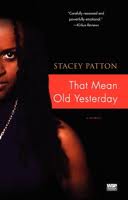 “Carefully reasoned and powerfully emotional.”
“Carefully reasoned and powerfully emotional.”
– Kirkus Reviews
“A riveting tale…touching and instructive; the style penetrating and effective.”
– Library Journal
“An astonishing coming-of-age story…. Patton’s triumphant story will inspire African Americans to reconsider their treatment of children and their histories and be moved to better understand themselves.”
– The Philadelphia Tribune
“That Mean Old Yesterday, Stacey Patton’s feast of wonderful writing, is an extraordinary weave of memoir and racial history that transforms a black childhood and adolescence lived in hell into an unforgettable document of uniquely intelligent triumph.”
– David Levering Lewis, winner of the Pulitzer Prize for Biography
“Raw with pain, anger, and yearning, That Mean Old Yesterday also crackles with an abundance of intelligence, courage, and pure guts. Stacey Patton survived a childhood of abandonment and abuse and built herself into an accomplished, truly self-made young woman. Her memoir will grab you by the heart and blow your mind. A stunning literary debut.”
– Jill Nelson, author of the bestselling memoir Volunteer Slavery and, most recently, Finding Martha’s Vineyard: African Americans at Home on an Island
“Stacey Patton is a tour-de-force writer — weaving together her many gifts as a natural storyteller as well as a steel-eyed historian, scholar, sage, poet, and journalist. In That Mean Old Yesterday, Patton performs a kind of sleight of hand by telling her own heartbreaking and triumphant story in context of the collective journey of African Americans — out of slavery, through freedom, toward redemption. What makes this memoir even more universal and important is that in it we are movingly shown how it is possible to confront the past and why we must.”
– Mim Eichler Rivas, coauthor of The Pursuit of Happyness with Chris Gardner and Quincy Troupe
“For those of us who have lived through the war zone of family violence and the attempted denigration of the human spirit, Stacey Patton’s That Mean Old Yesterday is a testament that you can reclaim your life and positively impact the lives of others. In her deeply moving and revealing memoir, Patton powerfully reminded me that there is always hope.”
– Victor Rivas Rivers, actor, activist, and author of A Private Family Matter
Patton, a graduate student at Rutgers, was a baby when she entered New Jersey’s foster care system. Five years later, she was placed with a middle-class New Jersey couple eager to adopt. Myrtle and her husband, G, were both African-American, like Patton, but also deeply committed Pentecostals. While G was laid-back, Myrtle was a mean woman who believed she needed to beat and whip Patton to make her submissive, to prepare her for the modern realities of being a little black girl growing up in America. All the black children Patton knew got whipped whenever, wherever, and with whatever. This was part of our identity as black children. Patton believes this behavior came from the slave experience: It was what their parents knew and what their parents’ parents knew. It was a behavior that had deep roots in the plantation legacy. Patton intercuts the story of Myrtle’s abuse with vivid descriptions of the torture and beating of antebellum slaves. Unfortunately, G, helpless and emasculated… like many slave men, couldn’t stop Myrtle’s abuse. Eventually, Patton ran away, lived in youth shelters and won a scholarship to a good prep school. Patton’s account is brutal and will likely become controversial, as her racial stereotypes, particularly her assertion that most black children are abused by their parents, may raise eyebrows.
– From Publisher’s Weekly


Recent Comments